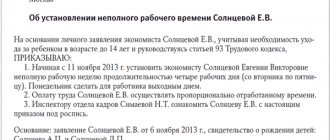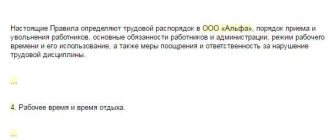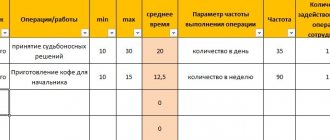How is it done?
Features of regulation of labor activity during combination, including issues of remuneration, are disclosed in Chapter 44 of the Labor Code of the Russian Federation.
So, in accordance with the provisions of Art. 285 of the Labor Code of the Russian Federation allows various options for remuneration of part-time workers.
It can be calculated as follows:
- in proportion to the time the employee worked,
- in accordance with the volume of products produced by a specific employee,
- on other conditions agreed upon between the part-time worker and the employer.
In general, all issues related to the remuneration of a person working part-time must be provided for in the employment contract.
How to indicate the salary amount when applying for a job?
Employers often have questions regarding the procedure for reflecting the salary amount in an employment contract.
In the employment contract, the employer must specify the full salary for a specific position (according to the staffing table), as well as indicate the rate allocated to a specific part-time worker. In this case, the conditions prescribed in Art. 284 Labor Code of the Russian Federation.
To make a correct entry, you need to know some of the features characteristic of part-time work. They are as follows (Article 284 of the Labor Code of the Russian Federation):
- the daily working hours of this category of workers should not be more than 4 hours (except for days when you do not need to go to your main job),
- for the entire month, the number of days (hours) worked by a part-time worker should not be more than half the monthly standard working time,
- the above rules do not apply to cases where the employee is removed from his main job or has suspended it.
Who calculates incentive payments to employees?
Such a worthy official is the chief accountant or simply an accountant . He must know the procedure for calculating and calculating incentive payments, and know the formulas for calculating them, which will be discussed below.
However, this issue is not the subject of this article.
An employee of the company's personnel service often acts as an assistant accountant in matters of calculating incentive payments . As a rule, he is better acquainted with the primary sources, which contain the procedure and methods for calculating incentive payments (which include the corresponding internal regulations, as well as the collective agreement).
What does the salary of such an employee consist of and how is it calculated?
The calculation of the salary of a person working part-time is carried out in accordance with the general procedure. Like any other employee, the final amount may consist of the following elements:
- salary,
- bonuses,
- surcharges, etc.
In general, there are several features that must be taken into account when calculating the salary of a part-time worker:
- The salary amount is set in accordance with the staffing schedule. In this case, the restrictions on the amount of working time established for this category of workers must be taken into account,
- If the employer makes any additional accruals (bonuses, additional payments, etc.) in favor of its employees, then a part-time employee is also entitled to receive them.
- If a person combining his main job with a part-time job works in a territory where regional coefficients and bonuses are established, then they are also applied when calculating his wages (Part 3 of Article 285 of the Labor Code of the Russian Federation).
Do I need to pay extra to the minimum wage?
In accordance with Part 3 of Art. 133 of the Labor Code of the Russian Federation, the monthly salary of employees who have worked in full the standard working time and labor must not be lower than the minimum wage.
Part-time workers have the right to claim all guarantees and compensation provided for by labor legislation. This is provided for in Part 2 of Art. 287 Labor Code of the Russian Federation.
Thus, this category of workers must also receive wages not lower than the established minimum wage.
But the following must be taken into account:
- As a rule, part-time workers receive remuneration for work in proportion to the time worked. Based on this rule, in this case additional payments must also be made up to the minimum wage.
- It is also necessary to take into account the size of the bet. If a part-time worker works part-time, then the minimum wage must also be divided in half. That is, the payment amount must be at least ½ minimum wage.
Let's look at an example:
If employee Ivankina I.A. has 0.5 wages in another organization (besides the main place of work), and she has fully worked the standard working hours, then her salary must not be lower than ½ of the minimum wage.
Thus, if at the end of the month it was established that the part-time worker received an amount less than the minimum wage, calculated in proportion to the time worked and taking into account the rate, then the employer must make an appropriate additional payment.
Is it necessary to award a seniority bonus to an external part-time worker who works at 0.5 times the rate?
In accordance with Part 1 of Art. 287 of the Labor Code of the Russian Federation, guarantees and compensation must be paid only at the main place of work to the following employees:
- combining work with study,
- living in the Far North and other areas equivalent to this territory.
In all other cases, part-time workers have the right to receive from the second employer all guarantees and compensation provided by law.
From the above, it follows that external part-time workers should also receive bonuses for length of service. Moreover, in this case the fact that it works for only 0.5 bets does not matter.
Is an advance issued?
As noted above, part-time workers are subject to the same rules as other employees. We also remind you that the concept of advance payment is absent in labor legislation. Moreover, in Part 6 of Art. 136 of the Labor Code of the Russian Federation clearly states that salaries must be paid every half month.
Thus, the so-called advance (and in fact half of the salary) should also be given to part-time workers . Paying wages once a month will be considered a violation of labor law.
Example of salary calculation
In order to better understand how a part-time worker’s salary is calculated, we should look at a specific example.
Rotar M.I. works at her main job from 8.00 to 16.00. At the same time, she also performs part-time functions as a cleaner in a cleaning company from 17.00 to 21.00 (4 hours a day).
Works a second job every weekday. The salary provided for the position of a cleaner is 17,000 rubles. At the same time, it works at 0.5 bets. There are 19 working days in February 2020. She worked this time in full.
So, it is necessary to determine the salary of a part-time Rotary M.I. employee for February 2020.
Calculation:
- Since the salary of Rotar I.I. depends on the amount of time worked, then first you need to calculate the cost of an hour of work for the position of a cleaner:
17,000 rubles / 19 working days / 8 hours (full time) = 111.84 rubles.
- Now you need to determine the salary of a part-time worker:
111.84 rubles * 4 hours * 19 days = 8499.88 rubles.
- Next, you need to find out whether the employer must make an additional payment in favor of a part-time worker in order to achieve the minimum wage level.
From January 1, 2020, the minimum wage in the Russian Federation is 12,130 rubles (Article 1 of the Federal Law of the Russian Federation dated December 27, 2019 No. 463-FZ).
Thus, part-time Rotar I.I. must receive at least 6,065 rubles (12,130/2). Her actual monthly salary is 8,499.88 rubles, that is, more than ½ the minimum wage. It follows that the employer does not need to make additional payments.
Quarterly bonus proportional to hours worked
An example of including four out of five quarterly bonuses in the calculation of average earnings. The organization has a Regulation on Bonuses, which provides for the calculation and payment of quarterly bonuses to workers. Bonuses are paid for exceeding the plan by 30%. The data for calculating bonuses is provided by the head of the department. Due to the fault of the department head, the data for calculating bonuses for the first quarter of 2014 were submitted at the wrong time.
Therefore, the bonus for the first quarter of 2014 was accrued only in the second quarter of 2014. In April 2020, worker A.I. Ivanov was on a business trip. The calculation period for payment of average earnings during a business trip is April 2014 – March 2020.
During this period, Ivanov was awarded five quarterly bonuses. When calculating average earnings, the accountant took into account only four quarterly bonuses.
Can such an employee receive more than the basic salary?
In practice, sometimes situations occur when the salary of a part-time worker turns out to be higher than the remuneration received by the main employees. This is possible in the following cases:
- if in a few hours the part-time worker manages to fulfill the norm provided for a full working day,
- when a person working part-time overworks the main employee,
- a part-time worker has higher qualifications.
In all these cases, the employer is interested in encouraging such an employee. That is why such a part-time worker will receive more than the main employees.
However, all these nuances must be included in the text of the employment contract.
Is it permissible to pay a full salary?
There is no consensus on the issue of the admissibility of calculating a full salary when working part-time. There are two opposing points of view, which are as follows:
- Payment of full salary to a part-time worker is unacceptable.
Some experts explain this opinion by the fact that, by law, a part-time worker cannot work more than 4 hours a day. The final amount of his salary is determined in proportion to the time worked. At the same time, Art. 22 of the Labor Code of the Russian Federation provides that the employer must provide employees with equal pay for work of equal value.
Thus, paying a part-time employee remuneration in the amount of the full salary (on the same basis as the main employees) can be regarded as discrimination against employees in the distribution of wages.
- The employer can provide a part-time worker with a full salary.
Supporters of this point of view point to the provisions of Art. 285 of the Labor Code of the Russian Federation, which clearly states that the management of an organization can establish remuneration for part-time workers not only in proportion to the time worked, but also on other conditions. Thus, the wages of this category of workers can not only be equal to the full salary, but even exceed it.
Which system is better to choose?
In order not to encounter controversial situations, as well as not to violate labor law norms, employers should choose a remuneration system that will not raise any questions. It could be:
- Payment of remuneration is proportional to the time the part-time worker worked.
In this case, it will not be possible to set the full salary. However, if the employer still intends to pay the part-time worker more, then you can choose another system (next point),
- Salary depending on output.
In this case, the specific amount may depend on sales volume, number of units produced, etc. Thus, with such a remuneration system, the salary of a part-time worker is not limited in any way, but depends entirely on his level as a professional.
Calculation of quarterly bonuses for actual hours worked
But they must differ in the reason (ground) for the bonus.
Moreover, each type of bonus may have its own circle of rewarded employees, its own conditions for accrual, its own evaluation system and its own grounds for depreciation. To learn how you can draw up a document combining a description of the wage system and the incentive system, read the material.
The procedure for calculating the quarterly bonus, as well as the incentive system itself, is developed by the employer independently. Options for determining the specific amount of the bonus can be considered by establishing the amount of the bonus: by calculating according to the formula established in the bonus regulations, summing up the bonus indicators assessed in monetary terms, which serve to assess the employee’s participation in the labor process, as a percentage of the actual accrued earnings for the period, in a fixed amount, serving as a salary bonus, as a percentage of the salary.








